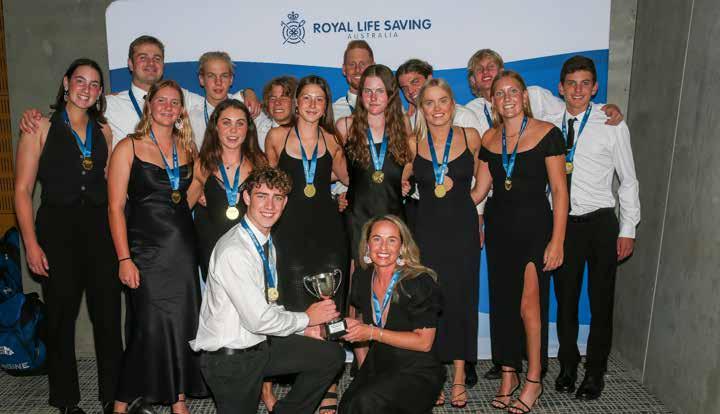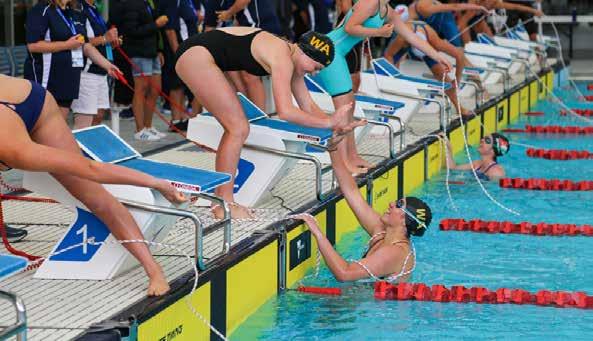




Australia Annual Report 2024
Kep Kaartdijin
‘Water Knowledge’
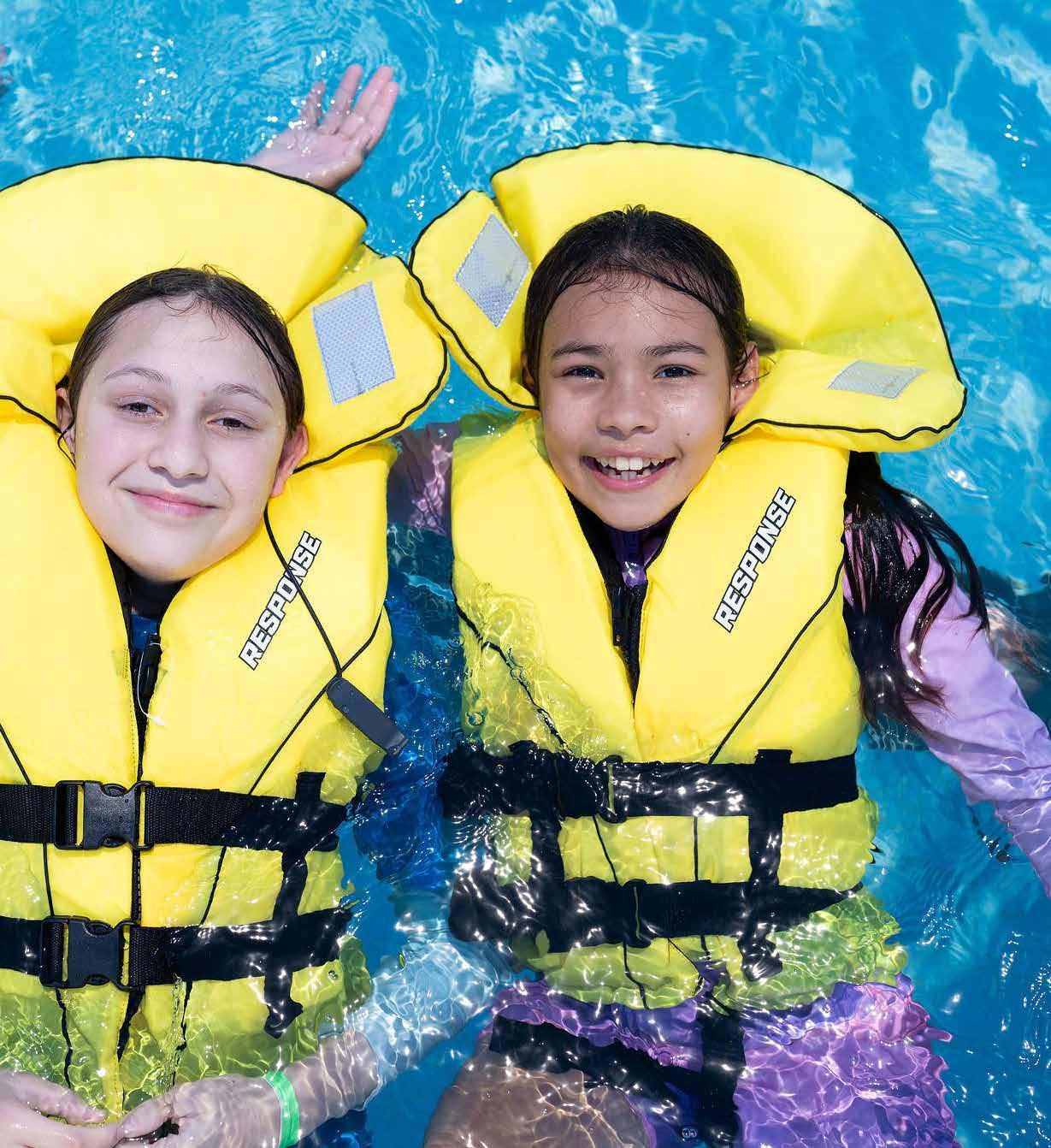

The tens of thousands who directly benefited from our programs and services continues to be a great source of pride. The facts, figures and case studies in this Annual Report provide an insight into the positive impact of our work. These outcomes would not have been possible without the support of our Principal Community Partner BHP, the WA Government, Lotterywest, Healthway and our sponsors. We thank them for their ongoing support.
This year the Board had a clear focus on optimising the alignment of effort with our Strategic Plan 2020 – 2024. The format of the Annual Report is based on these strategic objectives and includes a summary of progress made over the last five years. Reflecting on and analysing what has and has not been achieved is an important first step in developing our strategy for 2025 – 2029.
This year’s report also includes individual profiles and case studies. The overarching theme highlights the invaluable contribution made by youth and the many and varied ways they contribute to Royal Life Saving. Whether as program participants, competing in lifesaving events, volunteering in the community, fundraising, researching new ideas, training or mentoring others, we are all the better for their contribution and leadership.
World Conference on Drowning Prevention
Perth hosted the World Conference on Drowning Prevention from 4-7 December 2023. Attended by delegates from over 50 countries, it was the first time the Conference had been held in Australia and the first since the United Nations Resolution on Global Drowning Prevention. Having this globally significant event was a unique opportunity and honour for Royal Life Saving.
The key themes that emerged from the Conference were:
• Drowning prevention is multidisciplinary, multisectoral and bigger than any organisation. Seizing opportunities to collaborate, grow, and continue to expand collective impact.
• Drowning prevention is increasingly an issue of equity. Seeking out different perspectives and the creation of new inclusive opportunities.
• The future of drowning prevention efforts must place children and young people at the centre of decision making.
Australian Pool Lifesaving Championships
For the first time in 22 years the WA State Team were crowned Interstate Overall Champions also winning the Interstate U16 Champion, Interstate Open Champion, and Interstate Men’s Overall Champion categories. A remarkable achievement by our athletes, coaches and managers and an inspiration for others to follow.
This year we committed to building a stronger Reconciliation Action Plan (RAP) that actively engages and encourages Aboriginal and Torres Strait Islander peoples to access, design, participate in and lead water safety programs. Within the Annual Report are indicators of progress including our 37 Aboriginal employees, 31 Supply Nation suppliers, 76 fully funded swimming programs and our work in remote communities. We will continue investing time and resources to this commitment.
Increasingly program development is being coordinated with the national network of lifesaving organisations. Underpinned by a common purpose and values we have been collaborating and adapting our operations to maximise efficiency, effectiveness and sustainability.
Establishing a $10M Swim & Survive endowment fund from donors to support vulnerable and at-risk communities in perpetuity is increasingly vital. This year’s financial result along with retained funds has seen our fund grow to nearly $2.2M. Building this legacy will help future generations and we are grateful for the community’s generosity and support via donations, participating in a raffle or purchasing one of our fundraising products.
The Board formed a working group to review the Constitution and recommend changes to meet our contemporary needs and to align with the Model Rules published by the Department of Energy, Mines, Industry Regulation and Safety which meet the requirements of the Associations Incorporation Act 2015. Members adopted a new Constitution at a Special General Meeting held on 18 July 2024.
This year we were honoured to have Roger Cook MLA – Premier of Western Australia accept the role of Vice-Patron. We thank him for his support and for promoting the work of Royal Life Saving.
Tragically 41 people lost their lives to drowning between 1 July 2023 and 30 June 2024 in Western Australia. This is the most recorded cases since 2016/17.
We fear that Australian’s swimming ability is going backwards and may be at its lowest since Education Departments introduced large scale swimming and water safety education programs. Our research shows that many children miss out entirely on lessons and will leave primary school not being able to swim 50m. The barriers to lessons are often financial, logistical, language or cultural, and sometimes all four.
We must take the opportunity to build lifesaving skills in teenagers with a clear path to the Bronze Medallion. The lowest rates of drowning are in 10-year-old children however drowning rates increase sharply, more than ten-fold, by the age of 20 years. We must work with secondary schools and community groups to build layers of resilience through swimming, basic rescue and lifesaving skills.
I would like to thank our dedicated members, volunteers and Committees for their contribution and Royal Life Saving’s Chief Executive Officer Peter Leaversuch and his team for their continued support of the Board.

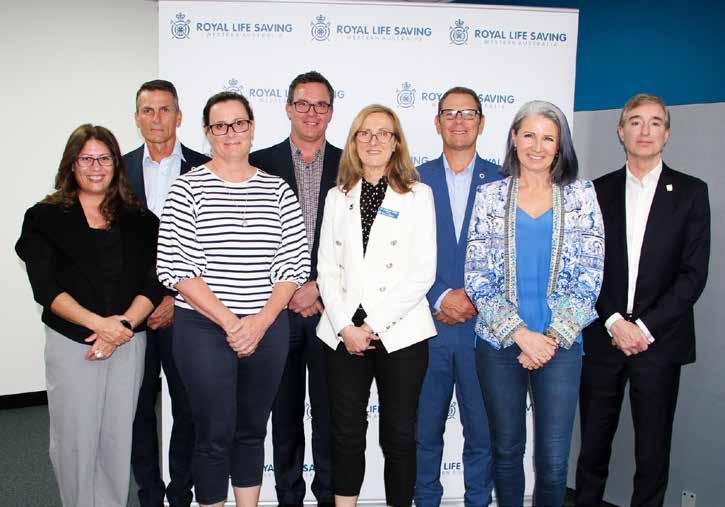

Shaping a global strategy.
Mobilising for local action.
4 - 7 December 2023
Perth Conference & Exhibition Centre
Western Australia
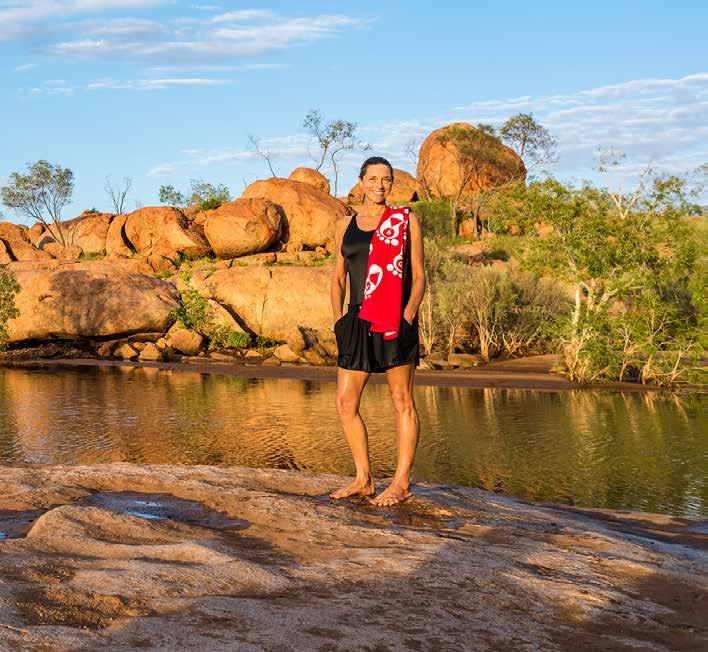
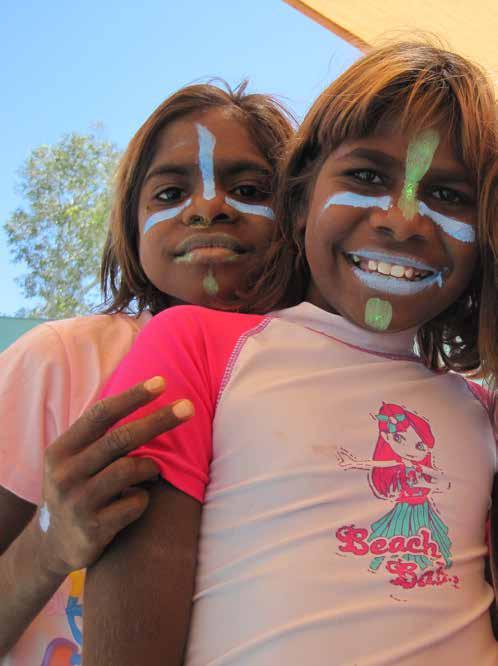
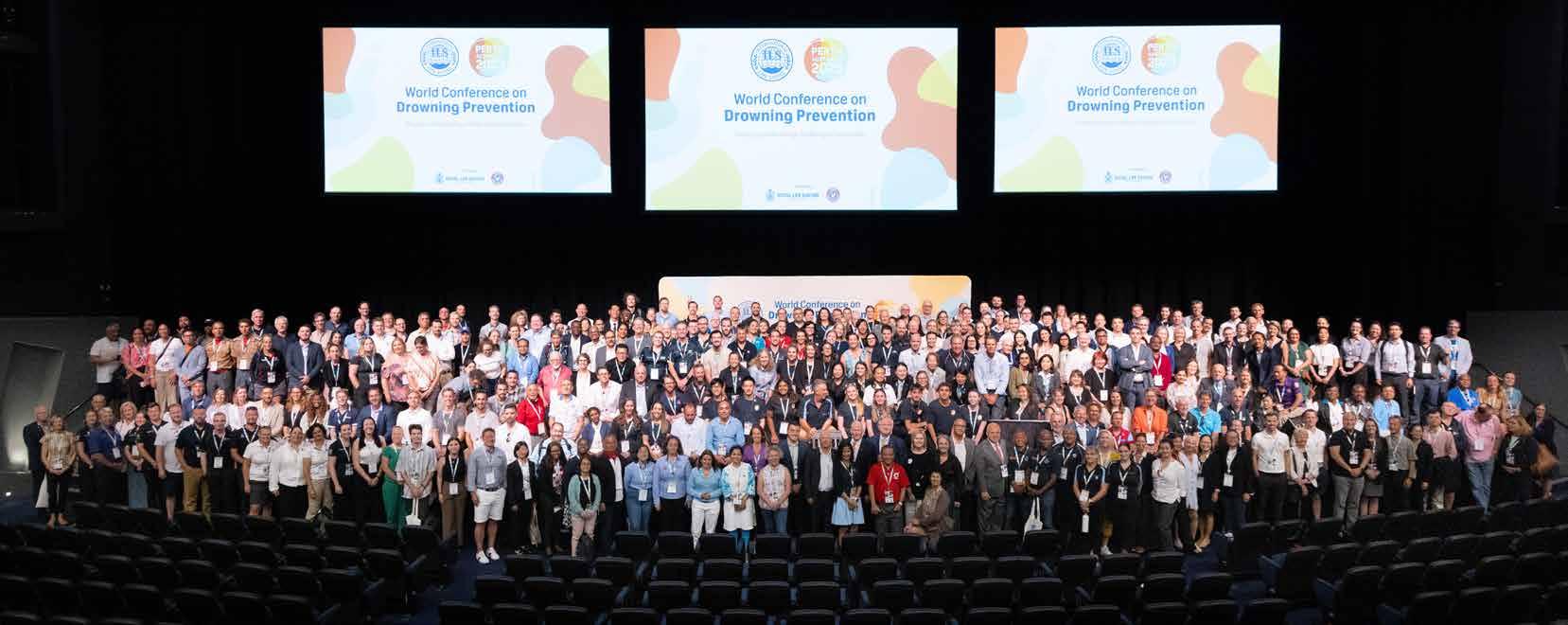
Water plays an important role in our way of life. It is a catalyst for healthy lifestyles and social inclusion.
Since 2003 we have been collaborating with BHP to drive innovation and positive change for regional and remote WA. With their support, we are delivering educational, employment, health, youth engagement and social cohesion outcomes.
In 2023/24 we delivered an innovative range of programs across multiple life-stages.
Infant Aquatics - the early years, water familiarisation classes that foster parent/child bonding.
Swim & Survive - school years, foundation lifesaving skills, incentivising school attendance and healthy eating.
Bronze Rescue - youth engagement, physical activity, sporting pathways and pre-vocational skills.
Talent Pool – pre-employment, transferable vocational skills, work experience and mentoring. Spirit Carnivals – co-designed aquatic events, opportunity for self-expression.
Cool Pool - creating a safe, inclusive meeting place. Building social capital.
This year the University of Western Australia – Centre for Social Impact undertook an evaluation of the program’s ‘theory of change’. The recommendations in this report will guide our future actions.
The report highlighted that the existence of pools and Royal Life Saving’s programs have a particular benefit for remote communities with respect to health and wellbeing including physical activity, increasing swimming abilities and water safety skills, socialisation, and for preventing disease and skin conditions.
Pools were also described as ‘community hubs’, facilitating social connection, creating new relationships and support networks, and providing a central location for a range of activities and providers. Social cohesion is being achieved through the utilisation of the pool space to facilitate outreach to young people.
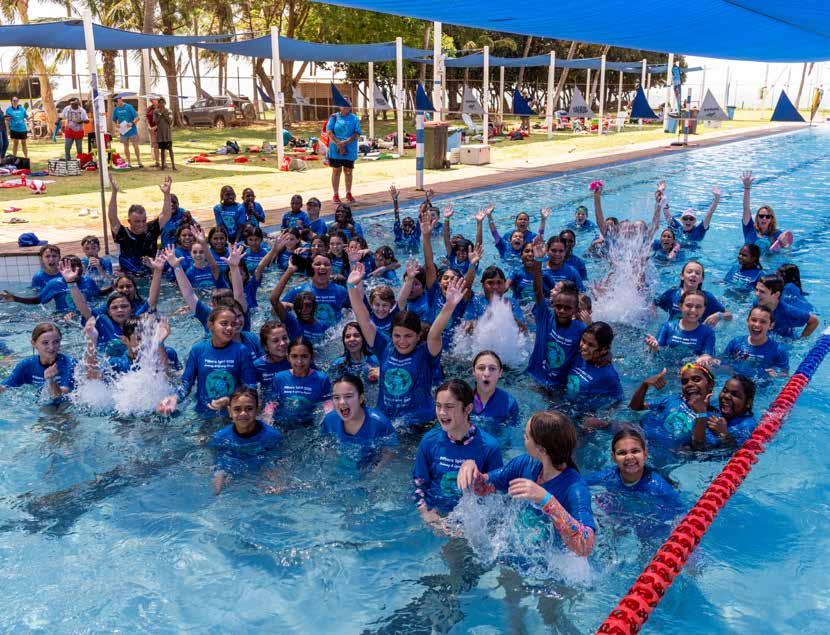
In November 2023, the spotlight was on swimming, lifesaving, and water safety as over 100 primary school aged children and 20 teachers from nine schools throughout the Pilbara attended the Royal Life Saving WA annual Spirit Carnival in Port Hedland.
Funded by Principal Community Partner BHP, this event showcased local talent and commitment to water safety through participation in a range of swimming races, lifesaving activities and aquatic sports.
Royal Life Saving WA research shows that the Pilbara region has the third highest drowning rate in WA with 55 drowning incidents recorded over the past ten years. People living in regional and remote areas often have access to a range of inland waterways such as rivers, lakes, dams and other natural waterways which can be unpredictable and pose unique safety challenges.
Senior Manager of Swimming and Water Safety Education at Royal Life Saving WA, Trent Hotchkin said “these swimming and lifesaving carnivals are a great opportunity for children to come together and gain valuable skills. It also engages them to participate in a range of fun and interactive activities aimed at developing skills to create the next wave of local community lifesavers.”
“Our focus is on equipping our young children with skills and knowledge that can potentially save lives, and we believe that through education and practice, we are building a safer community.”
Rachel Donkin, Manager WA Community BHP, says this important partnership with Royal Life Saving WA is one that is making a real difference in drowning prevention right across the state.
“We’ve been working together for 20 years to deliver vital swimming, water safety and lifesaving programs to regional and remote communities, making a real difference to people right across WA. Water safety programs like the Spirit Carnival are extremely important, particularly in regional communities where we operate, so we’re proud to be helping develop swimming skills and creating safer aquatic places for the kids of the Pilbara.”
There were 41 drowning deaths that occurred in Western Australia between July 1st 2023 to June 30th 2024. This is the most recorded cases since 2016-2017, where there were 44 drowning deaths in WA.
The drowning rate of 1.42 per 100,000 population increased by 7% this financial year, compared to the 10-year average.
The highest number of drowning deaths in WA occurred in the 45-54-year age group (24%), which also recorded the highest crude rate in the state with 2.75 drowning deaths per 100,000 population. Drowning deaths among children 0-4 years accounted for 7% of drowning deaths this year, recording a crude drowning rate of 1.77, an increase of 52% on the 10-year average of 1.16 per 100,000 population.
Over half (56%) of all drowning deaths in Western Australia were of people who lived in areas with IRSAD scores below 4, reinforcing the need for increased access and opportunities to swimming and education programs for those that need it most.
Drowning in WA most commonly occurred at beaches (32%), followed by rivers/creeks (22%) and 15% in swimming pools (majority being home swimming pools), while swimming (23%) or as a result of an unintentional fall into water (15%), indicating that people may not have had the swimming and water safety skills to help themselves out of difficulty.
41 Drowning Deaths in 2023/24
Residential fatal drowning rate by WA region, 2014/15 - 2023/24
This map shows the crude fatal drowning rates per 100,000 residents of each WA region. As an indication of the relative burden of drowning in each community, these rates are based on where people lived, not where the incident occurred.
1.42 2023/24 Fatal Drowning Rate per 100,000
Teaching children personal survival skills is the most important investment the community can make to reduce drowning. In the past year we had a combined 311,841 participants in all our swimming and water safety programs from Infant Aquatics to Bronze Medallion.
This statistic would not have been possible without our state-wide network of 443 local aquatic trainers, 118 Endorsed Swim Schools, 53 Junior Lifeguard and 17 affiliated Pool Lifesaving clubs.
The challenge we face is to ensure every new generation acquires water safety skills and that no one misses out. Currently sectors of our community from diverse cultural backgrounds, disadvantaged circumstances and regional areas do not have the opportunity, and we have acted by delivering a total of 177 funded programs including $55,841 from our Swim & Survive Fund.
Program participation for all ages
At Royal Life Saving, we are deeply committed to ensuring that every individual, regardless of their background, has access to life-saving swimming and water safety education. Our inclusive programs for migrant and multicultural communities are a key part of this commitment.
One program delivered throughout the Perth metropolitan area during 2023/24 saw 450 men and children from migrant and multicultural backgrounds attend swimming and water safety lessons, many for the first time. In addition, 150 multicultural children were engaged in classroom-based Water Safety Talks designed to equip participants with the knowledge to identify dangers in, on, and around different bodies of water.
Lessons took place at various locations across Perth, with children’s lessons taking place at Cannington Leisureplex and Leisurepark Balga, and Men’s Only Multicultural Lessons being held in Cannington, Balga, and Riverton Leisureplex.
These programs not only equip children with essential water safety skills but also foster a sense of belonging, confidence, and community. By teaching children how to swim and stay safe in and around water, we are making a significant impact on preventing drowning, especially in communities where water safety education may have been limited.
“Looking forward, we are dedicated to expanding this program, reaching more migrant and multicultural communities, and ensuring that every child, regardless of background, has the opportunity to develop life-saving swimming skills.”
Our strategic goal was to reach 300,000 swimming and water safety program participants by 2025.
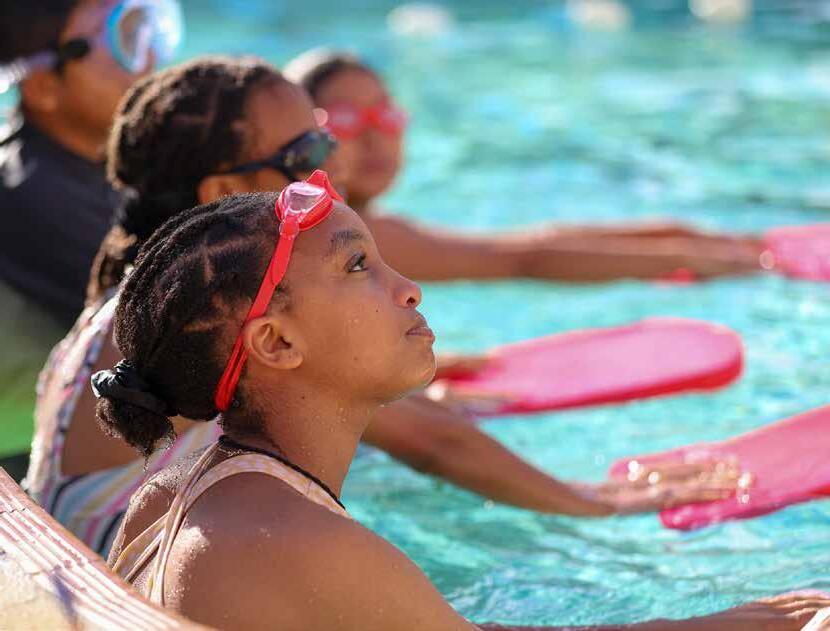
Every community needs trained lifesavers, instructors and first responders – to be there to help. Royal Life Saving has developed a comprehensive range of community focused education programs in survival, rescue and first aid as well as specific courses to meet the workforce training needs of the aquatic recreation sector.
Importantly, to ensure all Western Australians have access to this vital community and vocational training, we conducted regional programs that engaged 3,823 participants in locations from remote Kimberley communities to the Great Southern coast. Training was also provided to 897 participants living with a disability, 1,423 from multicultural backgrounds and 535 First Nation Australians.
Aquatic recreation facilities are visited over 12 million times per year and employ more than 4,000 lifeguards, swimming teachers, program instructors and pool operators. Key features of the aquatic recreation workforce are:
• 58% of the workforce are female.
• 34% of the workforce are employed casually and most work in a part-time capacity.
• 61% t of workers perform more than one role in the aquatic industry.
• Most workers draw satisfaction from making a positive impact on people’s lives and the community and interacting with patrons and colleagues.
This year, the National Aquatic Workforce Framework was launched. Our goal is to ensure that the aquatic industry remains a vibrant, safe, and rewarding field of employment.
Trained lifeguards / supervisors
1,373 hours of work cover supplied by our lifeguards
Trained pool operators
304 participants
13,751 hours of work cover supplied by our operators
Trained swim instructors / teachers
2,165 participants
11,338 hours of work cover supplied by our swim instructors
Trained first aiders
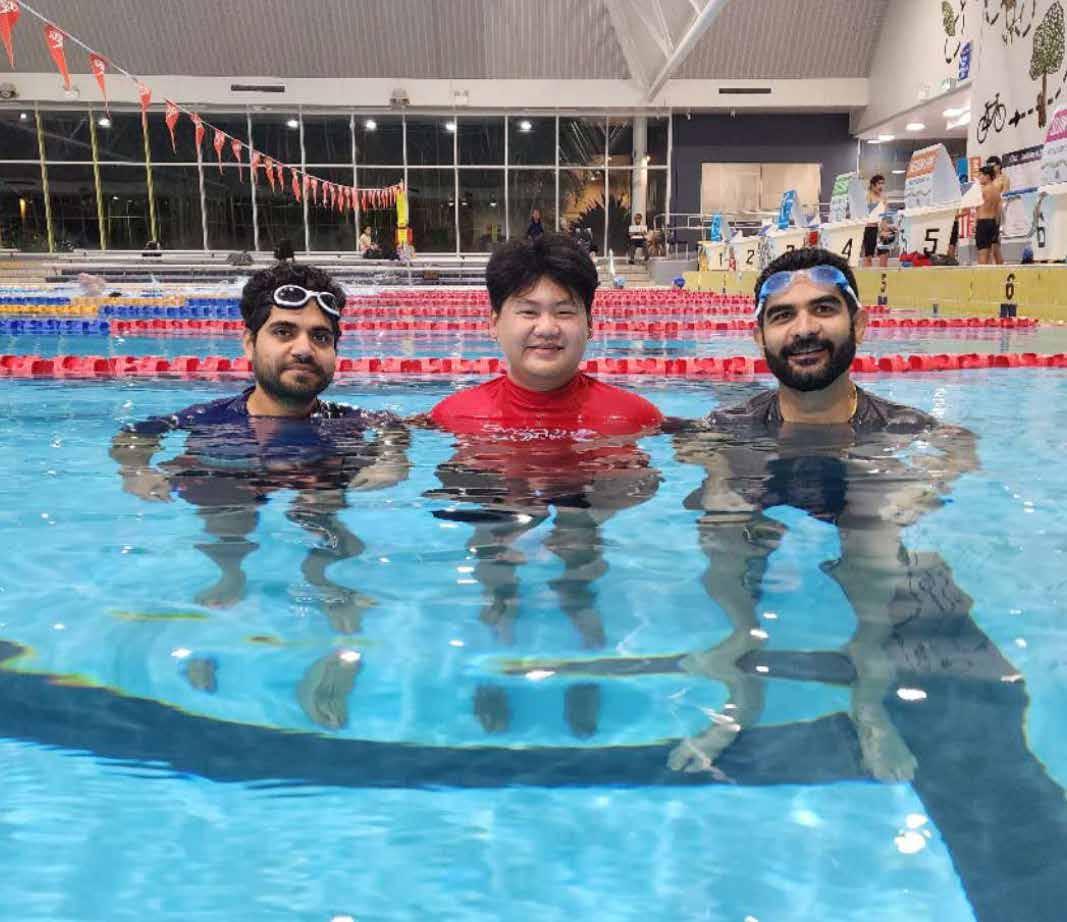
Championing Diversity: Young Swim Teacher Inspires Multicultural Communities
Royal Life Saving WA reached a significant milestone in 2021 with the launch of the Swim Teacher by Royal Life Saving WA course. An even greater achievement came in February 2024, when the number of active Swim Teacher license holders in WA surpassed 1,000.
strategic goal is to issue a combined total of 150,000 qualifications by 2025.
Our data shows that the 18-year-old age group had the largest uptake in the Swim Teacher course. 18-year-old Royal Life Saving WA swimming instructor Harry Luan is one of these motivated Swim Teachers leading the way for multicultural men to become swim teachers.
After arriving in Australia, Harry completed the entire Swim and Survive curriculum, which sparked his passion for swimming and led him to pursue a career as a swim teacher. He now teaches at four swim schools and is passionate about teaching both children and adults, particularly multicultural men who face challenges similar to those he encountered when learning to swim after immigrating to Australia.
“I want to empower more multicultural communities to embrace swimming, as it is an integral part of Australian community life and identity. Like many of them, I immigrated from a country where swimming is not considered an essential skill and is not highly regarded.
“I faced similar challenges when I first moved to Australia, such as language barriers, limited access to affordable swimming lessons, and the fear of water as before taking swimming lessons in Australia, I had little exposure to water.”
Drowning remains the leading cause of preventable death in children aged 0–4 years in Australia and toddlers have a greater risk of both fatal and non-fatal drowning than any other age group.
Royal Life Saving is committed to tackling this vital issue by leading coordinated action focused on strengthening community education and awareness through the Keep Watch program, increasing participation in Infant Aquatics and creating safe places through delivery of comprehensive home pool barrier assessment programs. This year, Royal Life Saving partnered with Kids Alive to ensure that more parents had the skills to respond in an emergency by providing a free online Heart Beat Club course.
Our health promotion team implemented a number of innovations in 2023/24 to raise awareness of our Keep Watch message by:
• Targeting at-risk communities including multicultural and regional communities.
• Expanding the range of communication channels (media, digital, face-to-face).
• Influencing perceptions and behaviours via hands-on workshops.
• Strengthening stakeholder support provided by local governments and the child health network.
• Delivery of online first aid training courses aimed at providing parents with young children the knowledge and skills to respond in an emergency.
Educating parents on safe supervision
373,147
Watch digital advertising views
Watch resources distributed
media engagements
to face engagements
familiarisation and modelling of safe behaviours
Infant Aquatics participants
Watch workshop participants
This summer, Royal Life Saving WA re-launched its Keep Watch ‘Kids can’t help themselves around water, you need to’ media campaign in an effort to remind parents about the importance of supervision when in and around the water.
The new phase of the ‘Kids can’t help themselves around water’ campaign was filmed in WA and was aired nationally throughout summer to remind parents and carers about the risks of child drowning. The extension of the campaign this year highlights two new characteristics often seen in young children that can put them at risk around water.
“The Sidekick” will follow their older siblings anywhere and won’t be left out of anything – even the water. The inquisitive nature of “The Curious One” means they get immersed in everything, which can lead them dangerously close to water.
Andrea Wakefield shared her story as part of the new campaign launch and knows all too well the devastating impact child drowning has on a family after her 14-month-old drowned in a backyard pool in 2013. This year marked the ten-year anniversary of her daughter Shelby’s drowning. Now the grief serves as a reminder of how lucky they were to have Shelby in their lives, even if it was for a short period of time.
Andrea’s one hope as a Royal Life Saving WA ambassador is that Shelby’s death can help raise awareness so that other children’s lives can be saved.
“We realised Shelby would be leaving primary school this year to start high school, a reminder of milestones Shelby never got to make. Whilst the emotions are still there, they continue to sink further into the back but are never gone.”
“We know that something terrible happened to us and we’re never going to get over it, but at the same time we want to make the best of that and tell the story of what happened so that people become aware of how it can be prevented. As we head into summer, please be aware, be present and most of all enjoy all the little moments you have with your kids.’’

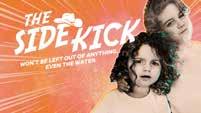
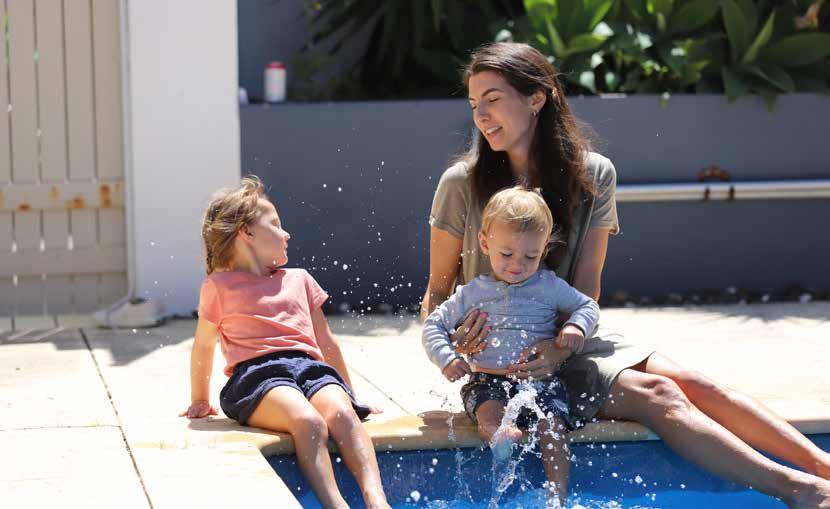
Our commitment to ensuring the safe participation of all West Australians in waterbased activities has never been stronger.
Through a comprehensive range of programs and initiatives, we aim to instil positive behaviour, raise awareness of water safety risks, and empower individuals to make informed decisions around water. By working with schools, community organisations, and industry partners, we promote safer practices and foster a culture of responsibility that helps prevent drowning incidents. Our focus remains on building a safer aquatic environment for everyone—whether they are learning to swim, enjoying recreational activities, or working in aquatic settings.
Campaigns to increase community awareness and action delivered in 2023/24 included:
• Keep Watch
• Make the Right Call
• Old4New Lifejacket Upgrade
• Youth Water Safety ‘Be A Mermate”
• Watch Around Water
• Summer Drowning Toll
• World Drowning Prevention Day
Campaign activations in 2023/24:
• Media advertising through TV, radio, and print
• Social and Digital Media activations
• Delivery of online education and training workshops/courses
• Program ambassadors sharing stories and promoting safety.
Importantly, we conducted research and evaluation to monitor progress, gain deeper insights into emerging high-risk communities, such as international students, guide policy development and ensure evidenceinformed practice.
Be a Mermate – Youth Water Safety Campaign
3,883,574 advertising impressions (streaming and free to air)
brochures/handouts 6,472 digital/social media engagement
event/workshop participants
Make The Right Call – Adult Water Safety Campaign
5,628 brochures/handouts
1,259 digital/social media engagement 2,372
participants
Around WaterPublic Pool Supervision Campaign
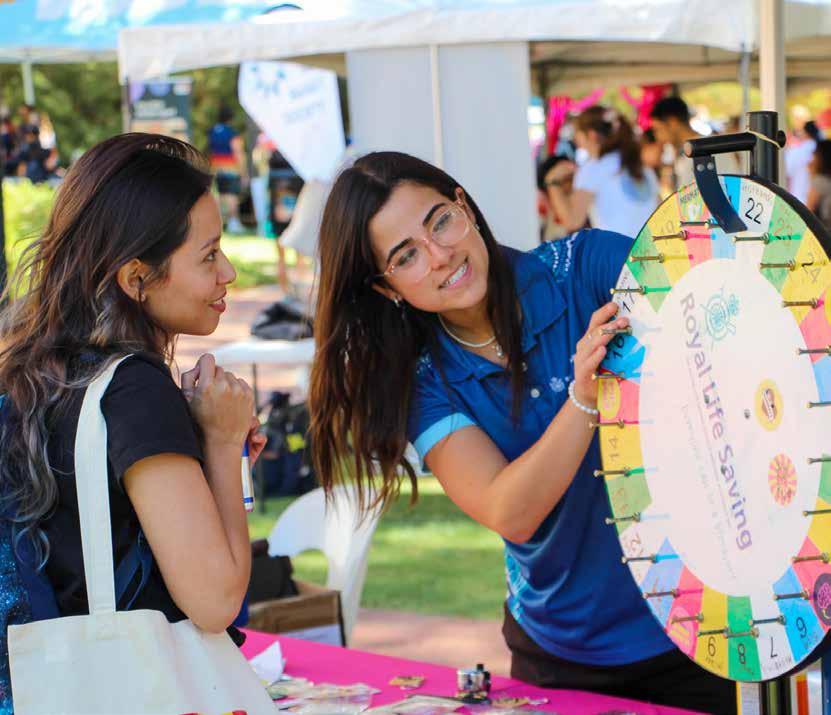
Royal Life Saving plays a crucial role in ensuring the safety of school leavers, during end of year celebrations held in the South West.
This year, our Youth Water Safety team sent 10 volunteers to provide vital water safety education, supervision, and support to create a safe environment for the young revellers.
Through engaging activities and one-on-one interactions, our volunteers not only kept participants safe but also recruited a new wave of “Mermates” by promoting the importance of looking out for each other around water.
Throughout the full week, volunteers distributed a total of 4,896 resources, had 3,647 conversations with Leavers about drowning prevention, and 1,393 Leavers were involved in diversionary activities including volleyball, lawn games and beer-goggle activities.
The highlight of the celebrations was the annual BeachFest event at Meelup Beach, where 4,150 school leavers enjoyed a fun-filled day of inflatables, beach sports, and lawn games. The sunny skies, cool water, and beach cabanas made for a memorable and safe experience for all leavers that attended.
Western Australia is dotted with pools and lakes and crisscrossed with rivers. There is an increased drowning risk linked with the increased number of people seeking out remote waterways, day trips to isolated rivers and holidaying to unfamiliar locations. Additionally, extreme weather events, both hot days and flooding rains increase exposure to water and the risk of drowning. Not all aquatic environments can be monitored by lifeguards, but all can be made safer with better guidelines, targeted action in black spots and greater community awareness of the risks.
Safety in public pools remains a key focus. We undertake detailed research to measure the types of injuries and incidents that occur for the 12 million patrons and established safety benchmarks. Compliance assessments were provided and risk management plans created. Procedures were tested, signage solutions designed and qualified staff supplied.
Royal Life Saving is proud to support a number of remote Aboriginal communities with swimming pools. Our efforts focus on positive change and strengthening overall community wellbeing.
The outcomes of our endeavours included:
Increasing physical activity.
Improving health outcomes, in particular earnose-throat and nutrition through our Swim For Fruit program.
Incentivising school attendance through our No school, No pool program.
Creating local jobs and transferable vocational skills.
Fostering social cohesion via a safe meeting place.
Social impact on local communities:
Stronger family and community connection
Strengthen connection to country
Improved health, well-being and economic participation
Greater self-determination/autonomy
Improving sharing of cultural knowledge
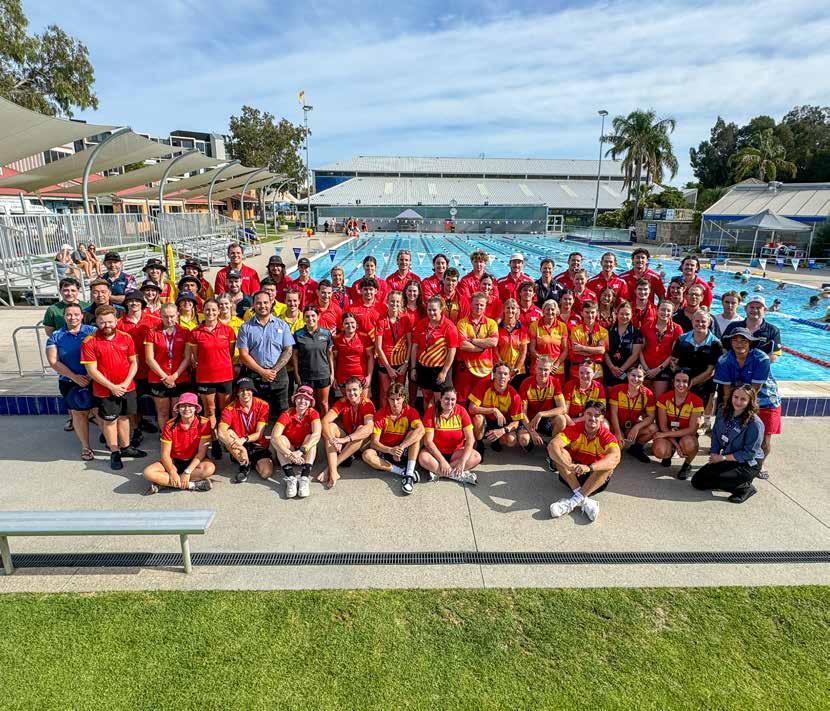
Pool Lifeguard Challenge 2024
Safer Home Pools
5,864
Safer Inland Waterways
31 risk assessments and safety plans
229 Old4New lifejackets exchanged
Remote Swimming Pool Engagement
67,563 total patronage
4,996 students achieved a lifesaving award 57 pre-vocational training participants
10 creation of local jobs (employment outcome)
2,609 healthy eating/nutrition participants
119 hosting of school education classes
82 events fostering social cohesion
This year, 13 teams from aquatic centres throughout WA gathered at the Fremantle Leisure Centre to compete in the 2024 Pool Lifeguard Challenge.
The challenge is designed to assess lifeguards’ abilities through various swimming, water, and first aid events, such as manikin tow relays, rescue tube relays, and object recovery relays. These activities test not only the lifeguards’ physical strength and endurance but also their teamwork, communication, and supervision skills.
The event fosters continuous improvement while promoting camaraderie among lifeguard teams and aquatic centres throughout WA.
Teams competing this year included Armadale Fitness and Aquatic Centre, Beatty Park Leisure Centre, Cannington Leisureplex, Cockburn ARC, Riverton Leisureplex, Kwinana Recquatic, Mandurah Aquatic and Recreation Centre, Fremantle Leisure Centre and first time teams from Leisurepark Balga, Swan Active Beechboro and Newman Aquatic Centre who made the 1,200km journey to compete in the event.
This event allows lifeguards to compete against other aquatic venues and provides an opportunity to fine tune their skills, develop great team bonds and industry connections and to affirm the importance of their role knowing that in an emergency their skills, knowledge and teamwork is able to save lives.
The teams demonstrated exceptional skill in tackling the challenges, with Beatty Park emerging as the winner and Fremantle Leisure Centre securing second place.
Outstanding acts of bravery were recognised at a ceremony held in October 2023 at the State Reception Centre, Kings Park. The awards recognised individuals who have gone to the aid of someone in distress, sometimes at risk to themselves, who have shown initiative in rescuing someone from the water and outstanding efforts in providing emergency care to those who have been injured.
To mark the significance of the occasion, those in attendance included His Excellency, The Honourable Chris Dawson AC APM, Governor of Western Australia, members of parliament, local representatives, and Life Members of the Royal Life Saving Society.
In total, 70 individuals were honoured for their outstanding acts. Royal Life Saving WA’s President Vaughan Davies says each award recipient displayed exceptional courage, empathy, and initiative in emergency situations, sometimes at risk to themselves.
Gold Cross Gold Medallion Gold Star Commendation
Ella McIlveen
Leah Pieterse
Poppy Simmonds
Aman Banfal
Dion Brahim
Damian Cato
David Cullen
Ozcar Cullen
Richelle Dunn
Caris Dunne
Alanah Dunstan
Jessica Easey
Sharryn Ellis
Billy Fraser
Stelian Georgiev
Nick Grant
Leanne Gwynne
Dilan Hankinson
Anthony Lynch
Hayley Marlow
Kieran Massam
Nicholas Merlo
Samantha Milos-Brown
Ainslie Mitchell
Ashleigh Polinelli
Mark Potter
Daniel Snell
Emma Summerhayes
Senior Constable
Kelsey Timms
Stephen Waterman
Constable Dalton
Wynen-Gaugg
Eli Bellegarde
Ethan Bellegarde
Connor Butson
Robyn Chaisty
Jessica Cox
Bethany Denny
Millie Dickenson
Jake Dwyer
Senior Constable
Coen Greaney
Janelle Hartnett
Senior Constable Paxton Jones
Christian Lawalata
Jesse-Jayne Maclardy
Breanne Mitchell
Makinley Minchin
David Moore
Aimee Moss
Julian Olivier
Senior Constable
Martyn O’Mahony
Tyler Parish
Katharina Peters
Kerry Robinson
Joe Skehan
James Stimson
Hero grandson saves family members off Dampier coast
In August 2022, Daniel Snell, along with his younger brother, father, and grandfather, faced a life-threatening situation while on a boat near the Montebello Islands off the Pilbara coast after weather conditions took a turn for the worse, flipping their catamaran.
Reacting swiftly, Daniel dived back into the water after realizing his family hadn’t surfaced. He first rescued his younger brother, Mitchell, who was tangled in ropes, then swam down to save his grandfather, who was struggling beneath the water.
After pulling everyone to safety, the group climbed onto the overturned boat and activated an emergency beacon. They were soon rescued by a nearby tugboat and safely returned to shore. In recognition of his bravery, Daniel was awarded the Royal Life Saving Gold Medallion Bravery Award in October 2023.
“My main concern was to go find Pop. I knew my little brother and my dad would probably get out, but I realised if I don’t act, I might not see my Pop again.”
Alexis Bell
David Bodmer
Gemma Cashman
Zavier Cullen
Sophie Eden
Alex Ferris
Cade Ferguson
Sang Hong Khou
Kyle Johnstone
Jessica Nalder
Mahana Roy
Flynn Throssell
Helen Turner
Scarlett Walker
Wayne Weller
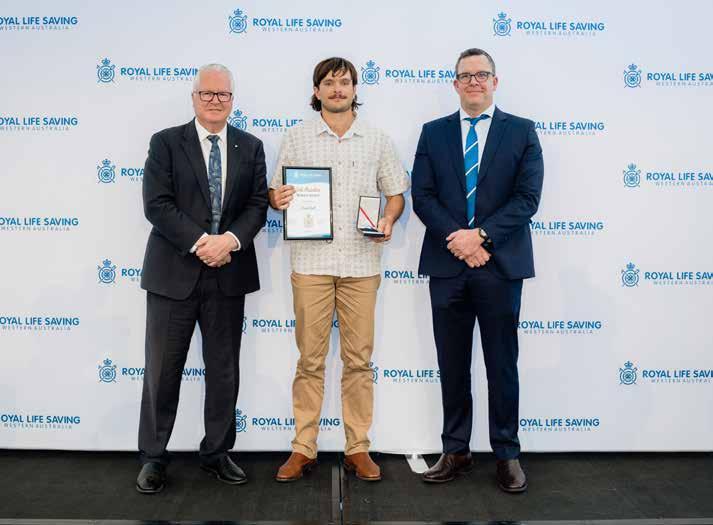
Royal Life Saving membership totals 44,733 across all categories (Training, Supporter, Sport, Associate, Life Members and Affiliated Organisations). For many it is a one-off or short-term connection, however, for a number, their contribution is far more substantial and represents the vital work of sharing lifesaving knowledge and empowering the community to be safe. Importantly for all members we strive to deepen engagement and connection to the Society.
Jake Smith achieved remarkable feats at this year’s Australian Pool Lifesaving Championships, earning the Male Lifesaver of the Meet title for the third consecutive year.
He also secured the Men’s Open Individual Championship and the Trenchard Miller Trophy. Remarkably, Smith accomplished this while recovering from two fractured wrists, showcasing his resilience and exceptional skill. His continued success competing in the sport for over a decade highlights his dedication and excellence in lifesaving.
Jake was named co-captain of the Australian National Team which competed in the Lifesaving World Championships in the Gold Coast in August 2024.
Staff Awards
Staff recognised for their contribution and service
to Royal Life Saving.
Long Service Order
Jen Mickle
Carys Munks
Peter Rossen
Meritorious Service Order
Sue Batchelor
Allan Godfrey
John Haynes
Tony Head
Lauren Nimmo
Glenda Stark
Outstanding Service Order
Helen Farr
Eddie Gibbs
Ruth Gillies
Lynette McLoughlin
Roberta Page
Supatmah Roberts
Maria Vellios
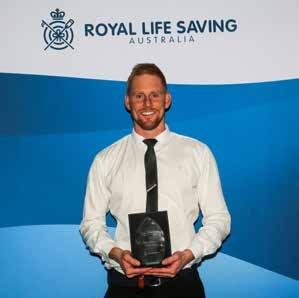
Member Awards
The following members were recognised for their contribution to Royal Life Saving.
WESTERN AUSTRALIAN HONOURS AWARDS AUSTRALIAN NATIONAL HONOURS AWARDS LIFE MEMBERS
Life Member
Marion Price
Outstanding Service Order
Robin Broad
Sandra Ciabarri
Marion Higgins
Barbara Worth
Meritorious Service Order
Juanita Adie-Cooper
Ian Goldthorpe
Kim Kowald
Graham Sharpe
David Townsend
Fiona Wilkinson
Long Service Order
Lynne Coles
Alicia Coppin
Ruth Damstra
Barbara Loh
Service Order
Joanne Jolly
Maja Pitts
Sonia Soltoggio
Brock Tranter
Aquatic Safety Advocate Award
Soraya Dasliva
Stuart Middleton
Mark Peddey
Sarahjayne Westberg
City of Cockburn ARC
La Grange Remote Community
School
Yandeyarra Remote Community School
Certificate of Thanks
Amanda Viljoen
Fellow Award (10 years)
Michelle Leanne
Justine Leavy
Kim McMinn
Dean Nottle
Bradley Riemann Stewart
Lesley Santer
Australian Resuscitation Award
Stephen Waterman
Hassan Shahzad
Phyllis McDaniel
Daphne Anderson
A. Frank Benson
MA Hamilton
FW Hammond
Mdme RC de Mouncey
Norman Collins
Ross Ewen
Fred Curran
Ern Halliday
M Edwards
JG Fraser
AE Middleton
Cyril Glew
Ernest Nancarrow
JM O’Brien
Michen Nicholas
Alf Peacock
David Anderson AM
R Davies
Lily Dale
Vic Dennis
Anita Eifler
David Smith
Fran Murphy
Crystal Humphrey
John Fussell
Dave Roberts
Margaret Davies
Joan Kent
Lester Marston
Hilta Billstein
Rae Blanchard
Noelene Maciejewski
Lilian Aiken
David Millington
Lydia Whittle
Gill Murrish
Greg McLennan
Ross Peters
Dr Heather MacGowan OAM
Audrey Cahill
Tom Ballantyne
Colin Barnett
Alex McKenzie OAM
Greg Tate
Ian Brown
Peter Leaversuch
Jacqui Lamb
Colin Hassell
Jeff Fondacaro
David Cummins
Sallie Watson
Marion Price
Governance
The Royal Life Saving Society – Western Australia Inc. is an incorporated association under the Associations Incorporation Act 2015 (WA) and a registered charity with the Australian Charities and Not-for-profits Commission.
Board of Directors
The Board is responsible to members for leadership of the association in accordance with Section 36 of the Constitution. The Board is comprised of seven independent Directors.
Name Tenure
Mr Vaughan Davies – President 7 years
Ms Carol Harper 9 years
Dr Justine Leavy 6 years
Mr Aaron Brinkworth GAICD 4 years
Ms Lisa Lilleyman 3 years
Mr Jonathan Seth GAICD 3 years
Ms Donna Oxenham 2 years
A profile of each Director can be found on our website at: https://www.royallifesavingwa.com.au/ about/who-we-are/board-of-directors
Board Charter
The Board has a Charter in place to define the roles, responsibilities, and authorities of the Board, both individually and collectively, in setting the strategic direction, management and control of the organisation.
Finance and Audit Committee
The Finance and Audit Committee is an advisory committee assisting the Board with monitoring financial management, external audit and providing recommendations to the Board on financial policy and strategy in line with established best practice.
Nominations Committee
The Nomination Committee is an advisory committee assisting the Board in fulfilling its responsibilities to members on matters relating to the composition of the Board and senior executive selection.
Chief Executive Officer
The Chief Executive Officer is appointed by the Board and is subject to annual performance reviews by the Board.
Board by Gender Board by Age Board by Cultural Background
Board and Committee Structure
Finance & Audit Committee Nominations Committee Accountability
Audit Assurance through reporting
Chief Executive Officer
Risk Management Framework
Governance & oversight Board
• Risk management policy
• Risk appetite and tolerance
• Assurance that risk management practices and insurances are appropriate. Day to day risk management
• risk management leadership
• material risks and their required controls
• reporting to management and Board
Management Team
• Risks owned.
• Risk management is adopted, applied and integrated.
• Allocate necessary resources.
• Effective internal controls are in place
Risk owners
• Risks are understood.
• Controls and actions are implemented.
Control and action owners
• Report to risk owner the effectiveness of controls and actions.
• Implement actions within agreed timeframes.
Royal Life Saving employs a workforce of 90 fulltime and part-time program coordinators, technical experts, administrative officers and management. Additionally, a pool of 408 casual staff were engaged in the roles of instructor, vocational trainer, lifeguard, pool operator, swim teacher, fundraiser and member service officer.
First Nations employees 45
Employees with a disability 5
Employees born overseas 82
Occupational Safety and Health Report
Royal Life Saving is committed to ensuring occupational safety and health is part of the way we do business. The safety and health of our employees, contractors, volunteers, visitors and all under our care is a core value and is central to our purpose of empowering our community to be safe when in, on or around water and leading efforts to reduce the impact of drowning.
Number of incidents/ hazards reported: 54
Days lost to injury: 0
Days off due to sick/carers/ personal leave: 532
Royal Life Saving is committed to improving gender equality outcomes and reports annually to the Workplace Gender Equality Agency. An executive summary of outcomes achieved by Royal Life Saving can be found here: https://www.wgea.gov.au/
Workforce Development
Building a motivated, capable, productive and healthy workforce continues to be a major focus. Regular surveys were undertaken to rate (as a percentage) various aspects of the total work experience.
Kalumburu Swimming Pool
Warmun Swimming Pool
Fitzroy Crossing Swimming Pool
Bidyadanga Swimming Pool
Yandeyarra Swimming Pool Port Hedland Office
Balgo Swimming Pool
Jigalong Swimming Pool Kununurra Office
Burringurrah Swimming Pool
Training Centre Bayswater Kalgoorlie Office
Head Office Mt Claremont
Training Centre Fremantle Mandurah Office Manjimup Office
Bridgetown Office

In many communities, access to swimming and water safety education is limited, leaving vulnerable groups at risk of drowning.
The WA Swim and Survive Fund focuses on providing opportunities to children and adults from lower socio-economic backgrounds, those with disabilities, Indigenous and multicultural communities, and those in regional and remote areas.
One such beneficiary is six-year-old Imogen, who lives with Fanconi Anemia. Due to her condition, Imogen’s mother, Rachael, struggled to afford one-on-one swimming lessons tailored to Imogen’s needs. Thanks to the Swim and Survive Fund, Imogen received personalized instruction and made remarkable progress, learning essential water safety skills like safe entry and exit from the water, standing independently, and floating.
It is these foundational skills that will form the basis of Imogen’s water safety skills for a lifetime. Imogen has always loved the water, but now she can swim and play in it safely.
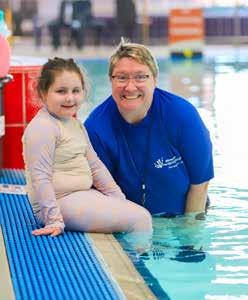
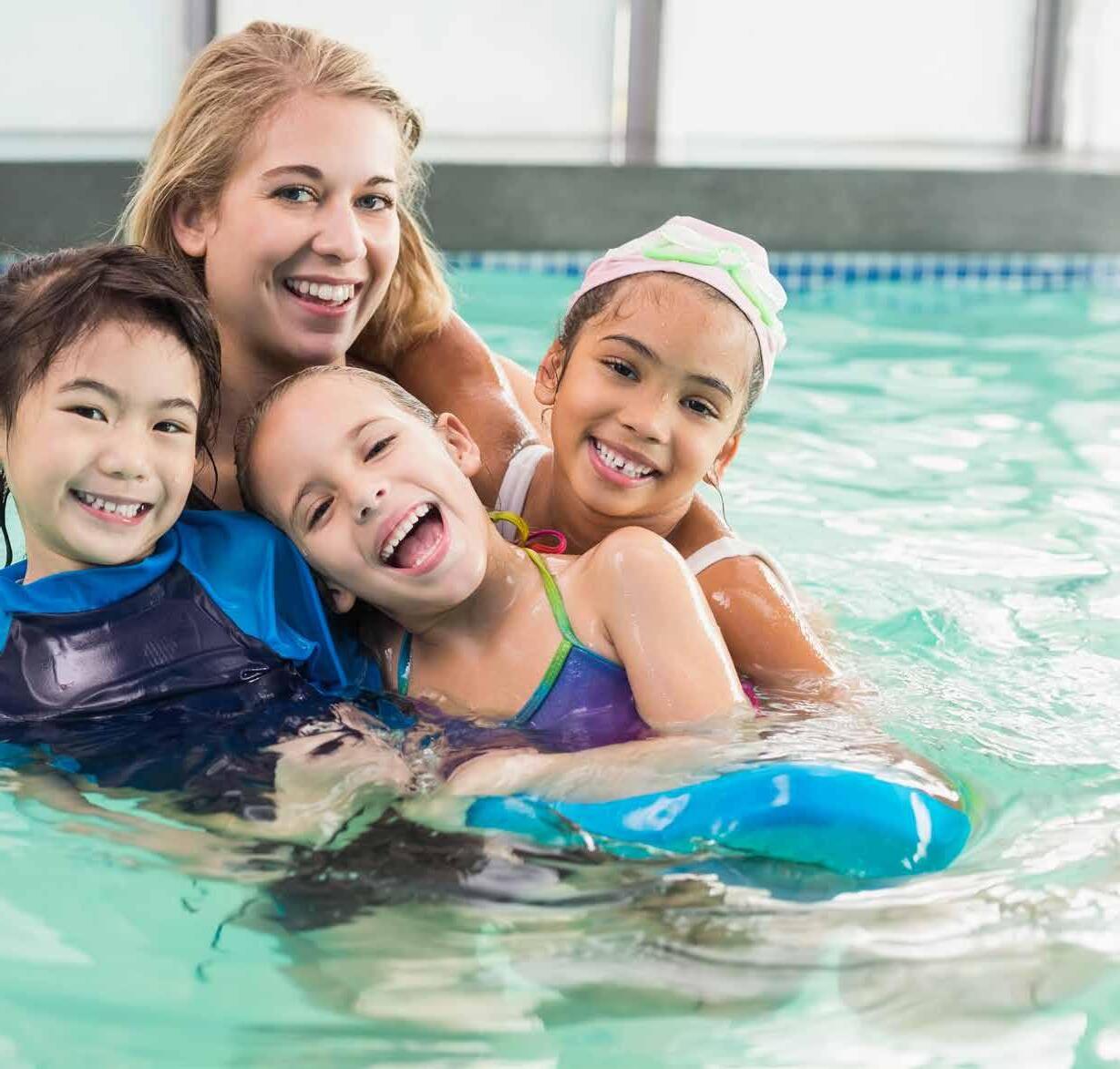



Independent Auditor’s Report to the Members of The Royal Life Saving Society Western Australia Inc
REPORT ON THE AUDIT OF THE FINANCIAL REPORT
Opinion
We have audited the financial report of The Royal Life Saving Society Western Australia Inc (“RLSSWA”) which comprises the statement of financial position as at 30 June 2024, the income and expenditure statement, the statement of changes in equity and the statement of cash flows for the year then ended, and notes to the financial statements, including material accounting policy information, and the declaration by the directors
In our opinion, the accompanying financial report of RLSSWA has been prepared in accordance with Division 60 of the Australian Charities and Not-for-profits Commission Act 2012 including:
(a) giving a true and fair view of RLSSWA’s financial position as at 30 June 2024 and of its financial performance for the year then ended; and
(b) complying with Australian Accounting Standards AASB 1060: General Purpose Financial Statements – Simplified Disclosures for For-Profit and Not-for-Profit Tier 2 Entities and Division 60 of the Australian Charities and Not-for-profits Commission Regulations 2022
Basis for Opinion
We conducted our audit in accordance with Australian Auditing Standards. Our responsibilities under those standards are further described in the Auditor’s Responsibilities for the Audit of the Financial Report section of our report. We are independent of RLSSWA in accordance with the auditor independence requirements of the Accounting Professional and Ethical Standards Board’s APES 110 Code of Ethics for Professional Accountants (“the Code”) that are relevant to our audit of the financial report in Australia. We have also fulfilled our other ethical responsibilities in accordance with the Code.
We believe that the audit evidence we have obtained is sufficient and appropriate to provide a basis for our opinion.
The board of management is responsible for the other information. The other information comprises the information included in RLSSWA’s annual report for the year ended 30 June 2024, but does not include the financial report and our auditor’s report thereon.
Our opinion on the financial report does not cover the other information and accordingly we do not express any form of assurance conclusion thereon.
In connection with our audit of the financial report, our responsibility is to read the other information and, in doing so, consider whether the other information is materially inconsistent with the financial report or our knowledge obtained in the audit or otherwise appears to be materially misstated.


If, based on the work we have performed, we conclude that there is a material misstatement of this other information, we are required to report that fact. We have nothing to report in this regard.
Responsibilities of the Board of Management for the Financial Report
Management is responsible for the preparation of the financial report that gives a true and fair view in accordance with the Australian Accounting Standards and the Australian Charities and Not-for-profits Commission Act 2012 and for such internal control as management determines is necessary to enable the preparation of the financial report that is free from material misstatement, whether due to fraud or error.
In preparing the financial report, the board of management is responsible for assessing RLSSWA’s ability to continue as a going concern, disclosing, as applicable, matters related to going concern and using the going concern basis of accounting unless the board of management either intend to liquidate RLSSWA or to cease operations, or have no realistic alternative but to do so.
Auditor’s Responsibilities for the Audit of the Financial Report
Our objectives are to obtain reasonable assurance about whether the financial report as a whole is free from material misstatement, whether due to fraud or error, and to issue an auditor’s report that includes our opinion. Reasonable assurance is a high level of assurance, but is not a guarantee that an audit conducted in accordance with Australian Auditing Standards will always detect a material misstatement when it exists. Misstatements can arise from fraud or error and are considered material if, individually or in the aggregate, they could reasonably be expected to influence the economic decisions of users taken on the basis of this financial report.
As part of an audit in accordance with the Australian Auditing Standards, we exercise professional judgement and maintain professional scepticism throughout the audit. We also:
• Identify and assess the risks of material misstatement of the financial report, whether due to fraud or error, design and perform audit procedures responsive to those risks, and obtain audit evidence that is sufficient and appropriate to provide a basis for our opinion. The risk of not detecting a material misstatement resulting from fraud is higher than for one resulting from error, as fraud may involve collusion, forgery, intentional omissions, misrepresentations, or the override of internal control.
• Obtain an understanding of internal control relevant to the audit in order to design audit procedures that are appropriate in the circumstances, but not for the purpose of expressing an opinion on the effectiveness of RLSSWA’s internal control.
• Evaluate the appropriateness of accounting policies used and the reasonableness of accounting estimates and related disclosures made by management
• Conclude on the appropriateness of management’s use of the going concern basis of accounting and, based on the audit evidence obtained, whether a material uncertainty exists related to events or conditions that may cast significant doubt on RLSSWA’s ability to continue as a going concern. If we conclude that a material uncertainty exists, we are required to draw attention in our auditor’s report to the related disclosures in the financial report or, if such disclosures are inadequate, to modify our opinion. Our conclusions are based on the audit evidence obtained up to the date of our auditor’s report. However, future events or conditions may cause RLSSWA to cease to continue as a going concern.
• Evaluate the overall presentation, structure and content of the financial report, including the disclosures, and whether the financial report represents the underlying transactions and events in a manner that achieves fair presentation.
We communicate with the board of management regarding, among other matters, the planned scope and timing of the audit and significant audit findings, including any significant deficiencies in internal control that we identify during our audit.
THE ROYAL LIFE SAVING SOCIETY WESTERN AUSTRALIA INC ABN 28 083 676 266
INCOME & EXPENDITURE STATEMENT FOR THE YEAR ENDED 30 JUNE 2024

We also provide the board of management with a statement that we have complied with relevant ethical requirements regarding independence, and to communicate with them all relationships and other matters that may reasonably be thought to bear on our independence, and where applicable, related safeguards.


STATEMENT
CASH FLOWS FROM OPERATING ACTIVITIES
Receipts
(284,798)
CASH FLOWS FROM INVESTING ACTIVITIES
Payments
CASH FLOWS FROM FINANCING ACTIVITIES
Payments for leases (51,139) (91,366)
Net cash used in financing activities (51,139) (91,366)
Net increase/(decrease) in cash held 1,574,757 (772,119) Cash
OUR CO-PATRONS
His Excellency the Honourable Christopher Dawson, AC APMGovernor of Western Australia
Mrs Darrilyn Dawson
OUR VICE PATRONS
The Honourable Roger Cook, MLA
– Premier of Western Australia
The Honourable Mia Davies, MLA
OUR BOARD OF DIRECTORS
Mr Vaughan Davies | President
Dr Justine Leavy
Mr Aaron Brinkworth
Ms Lisa Lilleyman
Mr Jonathan Seth
Mrs Donna Oxenham
Ms Carol Harper
FINANCE AND AUDIT COMMITTEE
Belinda Radalj
Mark.Summers
Stephen Pollard
Jonathan Seth
Carol Harper
EXECUTIVE MANAGEMENT
Peter Leaversuch
Chief Executive Officer
Allan Godfrey
Chief Marketing Officer
Ian Brown
General Manager, Operations
Greg Tate
General Manager, Community Development
Kirstie Beveridge Smith
Senior Manager, Corporate Services (October – June)
Travis Doye
Senior Manager, Workforce Solutions and Safety Services
Trent Hotchkin
Senior Manager, Swimming and Water Safety Education
Lauren Nimmo
Senior Manager, Research, Media, and Communications
Tim Turner
Senior Manager, Regional Development
Becca Osborn
Senior Manager, Digital Marketing and Brand
Laura Kazmirowicz
Senior Manager, Fundraising
PROGRAM AMBASSADORS
Keep Watch
Emma De Longis
Mark Gubanyi
Sharyn Hobbs
Melanie Mitchell
Michelle Ostler
Simone Soto Flores
Andrea Wakefield
The Honourable Matt Keogh, MP
The Honourable Josh Wilson, MP
Senator Louise Pratt
Swim and Survive
Mark Folkard, MLA
Yaz Mubarakai, MLA
The Honourable Reece Whitby, MLA
Dr Jags Krishnan, MLA
Reconciliation Steering Committee
Vaughan Davies
Donna Oxenham
Steven Jacobs
Greg Tate
Travis Doye
Tim Turner
Sport Committee
Jen Jones
Rebecca Hartman
Anna Haslinger
Trent Hotchkin
Eric Smith
Jake Smith
Multicultural Steering Committee
Afghan Young Leaders, Maria Aziz
Artistic Swimming WA, Camille Claudino
AseTTs, Shirin Dabous
Australian Asian Association, Marlene Burn
Bowls WA, Denise McMillan
Chung Wah Association, Jeni Nie Chong
Communicare, Caroline Maxwell
Edmund Rice Centre WA, Abul Ataie
Ethnic Communities Council of Western Australia Inc., Dr Sharan Kramer
Indian Society of Western Australia
Deepak Sharma, Dr Shweta Reddy
Kitwek Association, Amos Kiprop
City of Armadale, Musa Sheriff and Louise Warner
City of Bunbury, Sarah Van Velzen
City of Canning, Jordi Sullivan and Lani Zaknich
City of Cockburn, Liz Vuchocho
City of Gosnells, Pam Vincent
City of Kwinana, Emma Lavery
City of Stirling, Eva Mwakichako
City of Swan, Sarah Manson
Department of Education, Lisa Pilkington
Department of Home Affairs, Holly Chien
Department of Local Government, Sport, and Cultural Industries, Aaron Morse, Ziagul Sultani and Aaron Morse
ISHAR Multicultural Women’s Health Services Inc., Laila Zandi
Multicultural Services Centre of WA, Holly Dewar and Jean Paul Niyonzima
Perth African Nations Sports Association (PANSA) Inc., Kevin Castle
Perth Myanmar Learning Centre, Dim Boih
Red Cross, Zahra Fakki
Somali Community, Faisa Aden
Swim Mechanix, Elizabeth Fowler
WaterPonyz, Sophie Sindall and Suzette Thomas
Competitors from across Australia gathered at the Melbourne Sports and Aquatic Centre for the Australian Pool Lifesaving Championships (APLSC), where precision and real-life application are key. The Western Australian State Team surpassed strong contenders from Victoria and New South Wales to claim victory, winning the Interstate Overall Championship and the Sir Percy Joske Trophy—a title not held by WA since 2002.
Over the three-day event, WA’s team excelled in individual and team events, including obstacle relays, manikin tow, and CPR competitions earning six gold, one silver, and two bronze medals, with standout performances by Peter Traeger and David McCarron. The team also won the Interstate U16 Champion, Interstate Open Champion, Interstate Men’s Overall Champion, and Interstate Overall Champion.
The team and staff are looking forward to defending their title at the Championships in 2025.
